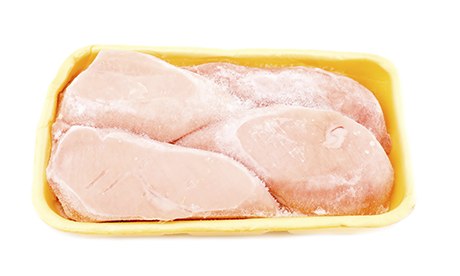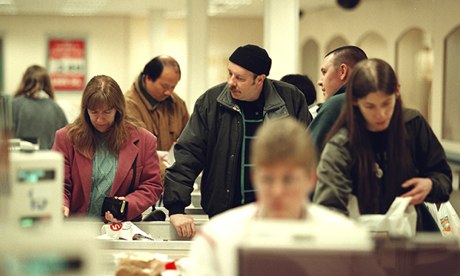Food sovereignty campaigners protest against the WTO in Bali, Indonesia this week. (Twitpic / @JHilary)In announcing a final agreement in Bali, Indonesia on Saturday morning, head of the World Trade Organization Roberto Azevedo,
said: "For the first time in our history, the WTO has truly delivered."
"There is a rank hypocrisy at the heart of the WTO that cannot be glossed over. The USA and EU continue to channel billions in subsidies to their richest farmers, yet seek to destroy other countries’ right to protect their poorest citizens from starvation. The WTO is an institution that has lost any claim to legitimacy. No amount of spin from Bali can disguise that fact." –John Hilary, War on Want
Unfortunately, say critics, what the deal is certain to "deliver" is more pain and suffering for the world's poorest people and farmers at the expense of the world's largest and most powerful nations and corporations.
Anti-poverty groups and food sovereignty advocates across the world were pushing off pronouncements like Azevedo's, saying that the agreement is a failure when it comes to fairness, poverty reduction, environmental protections, and the alleviation of hunger across the globe.
Among those slamming the final deal, director of the World Development Movement (WDM) Nick Dearden
said the Bali agreement is designed to serve the interests of "transnational corporations not the world's poor."
"Here in Bali," he continued, "social movements, trade unions and campaign groups have supported the efforts of developing countries to get a deal which moves the agenda away from a pro-corporate charter and towards something that asserts the rights and needs of the majority of the world's population."
And John Hilary, executive director of the UK-based War on Want,
slammed the deal:
Any suggestion that there is a deal to celebrate from the WTO talks in Bali is absurd. The negotiations have failed to secure permanent protection for countries to safeguard the food rights of their peoples, exposing hundreds of millions to the prospect of hunger and starvation simply in order to satisfy the dogma of free trade. It is time to end the WTO charade once and for all, and focus instead on undoing the harm it has already caused across the world.
There is a rank hypocrisy at the heart of the WTO that cannot be glossed over. The USA and EU continue to channel billions in subsidies to their richest farmers, yet seek to destroy other countries’ right to protect their poorest citizens from starvation. The WTO is an institution that has lost any claim to legitimacy. No amount of spin from Bali can disguise that fact.
This was not a historic win for developing countries at the WTO. They scrape by with modest and temporary protections for food security policies that should be completely excluded from corporate trade rules, which are still biased in the interests of corporations and rich countries. The bargain, if you can call it that, also came at the high price of agreeing to a trade facilitation agreement that further locks in a neo-colonial trading system that has condemned much of the world to poverty.
It is unfortunate that some countries will leave Bali with a vain hope that further negotiations will conclude the WTO’s so-called development agenda over the next year. The reality is rich countries like Canada, the United States and Europe have abandoned the idea completely and are focused on moving their corporate agenda as far as it can go in transatlantic and transpacific free trade deals, as well as a highly secretive international services agreement being negotiated on the outskirts of the WTO in Geneva by a small cabal of developed countries.
Though the so-called "peace clause" was agreed to, as previous
Common Dreams reportingindicated, the compromise does almost nothing to protect the world's poor over the long-term. In fact, critics warn, the so-called "compromise" sets up a ticking clock by which the poorest nations will be forced to throw their small farmers under the bus in the name of global capitalism.
 A street market in the old quarters of Delhi. India sought safeguards, at the WTO, from US agricultural surpluses. (Photograph: Ahmad Masood/Reuters)
A street market in the old quarters of Delhi. India sought safeguards, at the WTO, from US agricultural surpluses. (Photograph: Ahmad Masood/Reuters)
As French economist and food sovereignty campaigner Maxim Combes tweeted:
-
@EUmissionWTO @Trade_EU @WTODGazevedo #BaliPackage guarantee rights for TNCs and developed countries, not for people or for the planet
And Dearden added, "The aggressive stance of the US and EU means that we have moved only a little, and shows again that the WTO can never be a forum for creating a just and equal global economic system."
Dearden and Hilary were not alone in indicating that the WTO should be thrown overboard entirely if trade policies are ever to serve humanity and not just the bottom lines of transnational corporations (TNCs). As Pablo Solon, Executive Director of Focus on the Global South, tweeted:
The Bali Package is a severely imbalanced text that benefits only the developed countries and their TNCs
#EndWTO
The WTO is the world upside down. Few are getting more and more while the majority gets crumbs.
#EndWTO
And Mary Ann Manahan, Solon's colleague at FGS, added:
Yet again, WTO has failed to protect food security & peoples interests. There is a Bali deal. Corporations is having a field day!
#EndWTO
_______________________________________________
This work is licensed under a Creative Commons Attribution-Share Alike 3.0 License.












